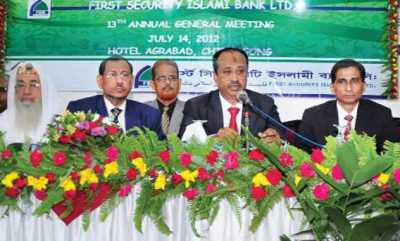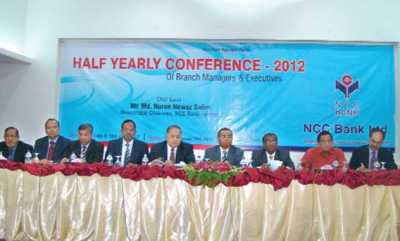Banking
FSIBL declares 10pc stock dividend
 Mohammed Saiful Alam, Chairman, Board of Directors of First Security Islami Bank, speaks at the 13th AGM of the Bank at Hotel Agrabad in Chittagong.
Mohammed Saiful Alam, Chairman, Board of Directors of First Security Islami Bank, speaks at the 13th AGM of the Bank at Hotel Agrabad in Chittagong.
First Security Islami Bank Limited declared 10 percent stock dividend for its shareholders for the year 2011.
The announcement came at the 13th annual general meeting of the company held at Hotel Agrabad in Chittagong Friday, said a press release.
Mohammed Saiful Alam, Chairman, Board of Directors of First Security Islami Bank Limited presided over the meeting.
Alhaj Mohammed Abdul Maleque, Vice Chairman, Board of Directors of First Security Islami Bank Limited, Sheikh (Moulana) Mohammad Qutubuddin, Chairman of Shariah Council, AA M Zakaria, Managing Director, Md. Abdul Quddus and Syed Waseque Md. Ali, Deputy Managing Director(s) of First Security Islami Bank Limited, Hannan Khan, Company Secretary were present.
The Daily Sun/Bangladesh/ 15th July 2012
NCC Bank branch managers’ confce held
 Md. Nurun Newaz Salim, Chairman of the Bank, seen at the half yearly branch managers’ conference of the Bank in Cox’s Bazar.
Md. Nurun Newaz Salim, Chairman of the Bank, seen at the half yearly branch managers’ conference of the Bank in Cox’s Bazar.
NCC Bank Limited organized a 3-day long half yearly branch managers’ conference at Cox’s Bazar Friday.
Md. Nurun Newaz salim, Chairman of the Bank inaugurated the conference as chief guest while Managing Director and CEO Mohammed Nurul Amin presided over, said a press release.
Tofazzal Hossain, former Chairman of the bank, Khairul Alam Chaklader and Ainul Kabir, directors were present. Golam Hafiz Ahmed, Additional Managing Director of the Bank, consultant AK Md. Siddique, Deputy Managing Directors Swapan Kumar Das, Mohabbat Khan, TM Faruque Chowdhury, Akhtar Hamid Khan, executives and branch managers attended the conference.
The Daily Sun/Bangladesh/ 15th July 2012
Visa, MasterCard, banks in $7.25bn retail settlement
NEW YORK: Visa Inc, MasterCard Inc and banks that issue their credit cards have agreed to a $7.25 billion settlement with U.S. retailers in a lawsuit over the fixing of credit and debit card fees in what could be the largest antitrust settlement in U.S. history.
The settlement, if approved by a judge, would resolve dozens of lawsuits filed by retailers in 2005. The card companies and banks would also allow stores to start charging customers extra for using certain credit cards in an effort to steer them toward cheaper forms of payment.
The settlement papers were filed on Friday in Brooklyn federal court.
Swipe fees - charges to cover processing credit and debit payments - are set by the card companies and deducted from the transaction by the banks that issue the cards, essentially passing on the cost to merchants, the lawsuits said.
The proposed settlement involves a payment to a class of stores of $6 billion from Visa, MasterCard and more than a dozen of the country’s largest banks who issue the companies’ cards. The card companies have also agreed to reduce swipe fees by the equivalent of 10 basis points for eight months for a total consideration to stores valued at about $1.2 billion, according to lawyers for the plaintiffs.
The deal calls for merchants to be allowed to negotiate collectively over the swipe fees, also known as interchange fees.
Merchants would also be required to disclose information about card fees to customers, and credit card surcharges would be subject to a cap, according to the settlement papers. Surcharge rules would not affect the 10 states that currently prohibit that practice, which include California, New York and Texas.
An additional $525 million will be paid to stores suing individually, according to the documents.
“This is an historic settlement,” said Bonny Sweeney, a lawyer for the plaintiffs. The settlement “will help shift the competitive balance from one formerly dominated by the banks which controlled the card networks to the side of merchants and consumers,” said Craig Wildfang, who also represented the plaintiffs.
Noah Hanft, general counsel for MasterCard, said the company believed its interests were “best served by an amicable resolution” of the case. Visa Chief Executive Officer Joseph Saunders said the settlement was in the best interest of all parties and did not expect the settlement to impact its current guidance.
Not everyone was pleased with the proposed settlement, however. One class plaintiff, the National Association of Convenience Stores, rejected the settlement in a statement on Friday from its president, Tom Robinson, who is also president of Robinson Oil Corp.
“Not only does the proposed settlement fail to introduce competition and transparency, it actually provides Visa and MasterCard with the tools to continue to shield swipe fees from market forces,” Robinson said.
The proposed considerations are a far cry from the $50 billion in swipe-fees paid each year by U.S. retailers, he said.
The American Bankers Association, a trade group whose members include the bank defendants, said retailers, not consumers, stood to gain the most from the proposed settlement.
“Big-box retailers will likely seize this opportunity to ask Congress for even more handouts,” said ABA President Frank Keating in a statement, referring to the Durbin amendment passed by Congress in 2010 limiting debit-card swipe fees - a move that banks say resulted in an $8 billion windfall for retailers.
The Daily Sun/Bangladesh/ 15th July 2012
HSBC’s money-laundering crackdown riddled with lapses
 An exterior view of the HSBC facility is pictured in New Castle, Delaware on Friday.
An exterior view of the HSBC facility is pictured in New Castle, Delaware on Friday.
NEW YORK: Executives of HSBC Holdings Plc and its U.S. subsidiary are scheduled to testify Tuesday before a Senate panel about how the London-based banking behemoth, after years of run-ins with U.S. authorities over alleged anti-money laundering lapses, has cleaned up its act.
In anticipation of the hearing, HSBC Chief Executive Stuart Gulliver sent a message to employees earlier this week: “Between 2004 and 2010, our anti-money laundering controls should have been stronger and more effective, and we failed to spot and deal with unacceptable behavior,” Gulliver wrote. “It is right that we are held accountable and that we take responsibility for fixing what went wrong.”
Gulliver’s memo implies that the bank’s problems ended in 2010. But a Reuters investigation has found persistent and troubling lapses in the bank’s anti-money laundering compliance since then.
Moreover, the problems arose in the very operation meant to show regulators that the bank could effectively monitor the trillions of dollars flowing annually through its offices in 80 countries and territories.
In a sprawling, low-rise building abutting pasture land in New Castle, Delaware, HSBC’s anti-money laundering staff review customer transactions and so-called alerts generated when the bank’s monitoring systems spot a suspicious transaction. It also housed the “look-back” at thousands of old transactions that the U.S. Comptroller of the Currency ordered in 2010, after citing the bank for multiple anti-money laundering failures.
Former employees in the New Castle office describe a febrile boiler-room environment overseen by managers uninterested in investigating transactions with possible links to drug trafficking, terrorist financing, Iran and other countries under U.S. sanctions, and other illegal activities. Instead, they say, the single-minded focus was on clearing out the paperwork as fast as possible.
“There were multiple backlogs” of alerts, said Everett Stern, who worked in the New Castle building from October 2010 to November 2011. “The name of the game was to close as many as you possibly can.”
Stern was a 26-year-old with a master of business administration degree when he joined HSBC as a compliance officer “to find suspicious activity,” as he put it. Within months, he was named a department specialist in Middle Eastern transactions.
“I’m not an expert” in money laundering in the Middle East, Stern said. His appointment, he said, was symptomatic of larger disregard for investigative rigor in the office. “Anybody who submitted their name for something basically got approved for that specialty.”
Stern said that in the course of his work, he came across many suspicious transactions. Some involved parties he suspected of having ties to Hezbollah and Hamas - Islamist groups that the U.S. considers to be terrorist organizations. When he alerted his superiors to these dealings, he said, his concerns were dismissed.
At one point, Stern said, he decided to take action on transactions linked to Palestine that he and some of his colleagues had noticed.
Stern sent an email to two superiors with the subject line, “Compliance error.” In the email, Stern wrote: “I believe investigators in the department are unknowingly making a major compliance error. Over the last couple of months investigators have approached me about cases in the Middle East, especially in Palestine.… It appears that most investigators do not understand that the government of Palestine is the terrorist organization Hamas.”
One of the bosses, Jeff Kraft, an anti-money laundering compliance manager, came bursting out of his cubicle. “Are you out of your f------ mind?” he said, according to Stern’s recollection. “I should fire you right now.”
Kraft insisted that Hamas was not a terrorist organization and that if government officials saw the email, the New Castle office would be shut down, according to Stern.
Hamas, which governs the Gaza Strip of the Palestinian Territories, has been designated a terrorist organization by the U.S. since 1995.
Kraft could not be reached for comment.
Stern was part of the New Castle operation employing regular HSBC staff to monitor current transactions and tackle a backlog of alerts. A second section comprised a task force - largely staffed with former law-enforcement officials working under contract - that was conducting the look-back the OCC ordered in 2010, investigating transactions up to several years old.
Several of these contractors, echoing Stern, said the effort was more cosmetic than concrete. One said that when an investigator couldn’t track down information on a counterparty to a particular transaction, the investigator was told to close the case even if it seemed suspect.
“I was extremely, extremely disappointed with the ethical part of how they were handling it,” said one former task force contractor. “It was just a factory the way it was handled. There was a lot of pressure to get investigations closed.”
The contractor added: “If Congress and the regulators actually knew what was going on, they would have a fit.”
Another contractor said supervisors “wanted quantity, not quality.”
In response to questions about the work at New Castle, HSBC spokesman Robert Sherman said: “The quality of work in Delaware has been and still is consistent with our high expectations. … We have had and continue to have very high quality control and assurance procedures.” Those procedures, he said, include regular reviews of the New Castle work by senior management and quality-assurance teams. A spokesman for the OCC, which ordered the look-back, declined to comment.
The Daily Sun/Bangladesh/ 15th July 2012
Al-Arafah Bank holds managers’ conference
Al-Arafah Islami Bank Limited organised half-yearly managers’ conference at a hotel in Dhaka Saturday.
Badiur Rahman, Chairman of the Bank inaugurated the conference as the chief guest, said a press release.
Ekramul Hoque, Managing Director of the Bank presided.
Alhajj Md. Harun-Ar-Rashid Khan, Alhajj Nazmul Ahsan Khaled and Alhajj Engr. Khondoker Mesbahuddin Ahmed, directors, Md. Rafiqul Islam, Kondoker Nayeemul Kabir, Md. Mofazzel Hossain and Kazi Towhidul Alam, Deputy Managing Directors and other senior executives of the Bank also spoke.
Managers from 94 branches of the Bank participated the conference.
The Daily Sun/Bangladesh/ 15th July 2012



